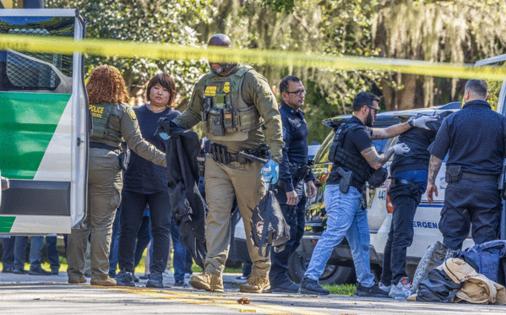Florida considering temporary housing to hold detained immigrants
Published in News & Features
TALLAHASSEE, Fla. — Gov. Ron DeSantis’ administration wants to set up temporary housing for immigration detainees in Florida, but has yet to release specifics on what such a plan would entail or say whether the idea has the support of the federal government.
Top Florida lawmakers have few or no details about the proposed plans, which were made public during a State Immigration Enforcement Council meeting on Monday. Senate President Ben Albritton and House Speaker Perez said this week they have not been briefed on specifics yet.
“There aren’t any specifics or details for him to consider at this time,” a spokesperson for the Senate president said in an email Thursday. “We don’t even know if this would require state funding, or what the Legislature’s role, if any, would be.”
Perez told reporters on Thursday that while he does not have the details yet, he understands that, in general, detention capacity for detained immigrants is a top priority for the Trump administration.
“Eventually, I’m sure we’ll be brought up to speed,” the Miami Republican said.
The revelation that the state is seeking to house detained immigrants comes as DeSantis and other state officials are pushing local and state law enforcement officers to help the Trump administration identify and detain immigrants who are in the country illegally.
As the state’s efforts ramp up, sheriffs have raised concerns that there are not enough beds to hold the number of immigrants that could soon be detained. Florida sheriffs had proposed a plan that would have allowed deputies to transport immigrants to U.S. Immigration and Customs Enforcement offices within the 48-hour period they are required to hold them in custody, but the federal government rejected it.
The push to find alternatives for detaining immigrants also comes as one of the four ICE detention facilities in Florida, Krome North Service Processing Center in Miami, deals with overcrowding issues.
The idea for the state to step in and help with temporary housing was first brought up at the Monday meeting as law enforcement officials on the council talked about how housing and transportation were two top areas where the state can assist U.S. Immigration and Customs Enforcement as it ramps up arrests and deportations.
At the meeting, Polk County Sheriff Grady Judd, who serves as the chairman of the State Immigration Enforcement Council, said the state should be allowed to “set up temporary housing to create much needed additional detention capacity.”
State Board of Immigration Enforcement Executive Director Larry Keefe then said that Kevin Guthrie, the head of the state’s Division of Emergency Management, is taking the lead on the idea and making the pitch to the federal government.
“He is really good about safely moving people and stuff around in high-stress, high-pressure emergency situations, including soft-sided facilities, hard-sided facilities,” Keefe said of Guthrie. “Whatever the state of the art is on planet Earth on how to house people, how to move people, and feed people and treat people safely and well, he knows it.”
The Florida National Guard could help with security issues if the plan takes off, Keefe added.
Beyond those details, not much else is known about the plan. For instance, the state has not said where it would set up the housing, what its capacity would be, if there would be a cost to Florida taxpayers or if the state has made headway on getting support from the federal government.
Keefe did not have an update on the Trump administration’s stance on the idea. But he broadly talked about “choke points” at the federal level that could prevent some of the state’s immigration enforcement ideas from happening. One of those “choke points” could be fear of lawsuits, he said.
“And if at the end of the day, it turns out to be ‘Oh, well, we might get sued,’” he said, “well, maybe that’s where it needs to play out.”
The Florida Division of Emergency Management did not respond to repeated requests seeking comment. A spokesperson for the Florida National Guard referred questions to the Division of Emergency Management, saying “it is their proposal and therefore out of our scope.”
Judd said in an interview this week that Guthrie and Florida’s Adjutant General John Haas “have made it abundantly clear that they’re eager and want to help with housing and transportation issues.” Haas oversees the overall management of the Florida National Guard and serves as DeSantis’ senior military advisor.
In Tallahassee, the plans have not been formally presented to state lawmakers. Republican leaders in charge of setting the budget for the Division of Emergency Management said they had not heard anything about the plans or whether it would require state funding.
Albritton, the Senate president, said through a spokesperson that he trusts the law enforcement officials leading the council, and the ideas they will consider.
“He trusts law enforcement, so if there is a proposal brought forward from the council about something they feel is needed, certainly he would want to learn more before making a decision,” the spokesperson said.
©2025 Miami Herald. Visit at miamiherald.com. Distributed by Tribune Content Agency, LLC.







Comments